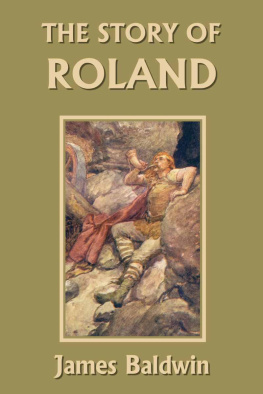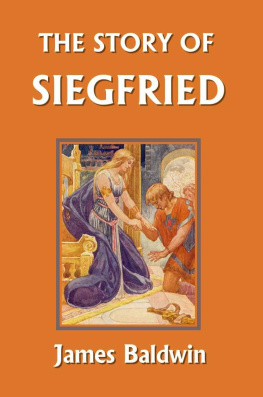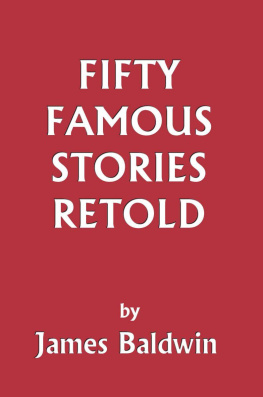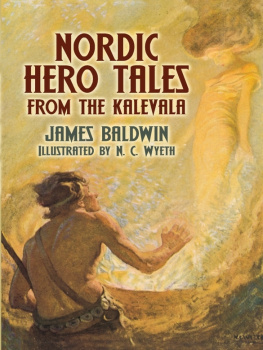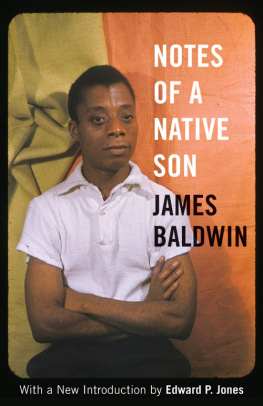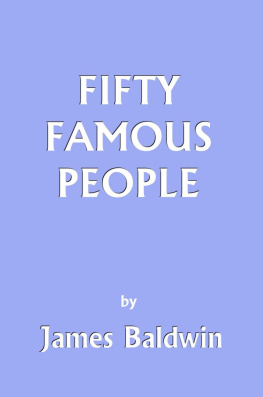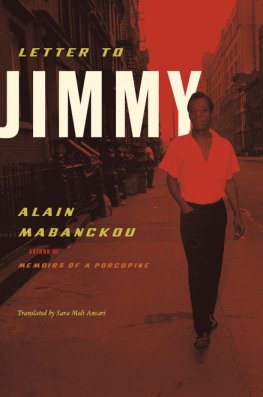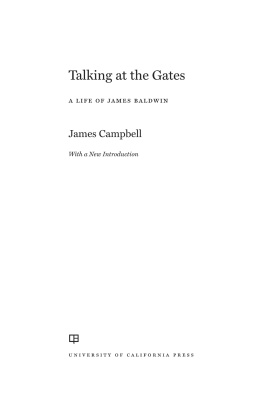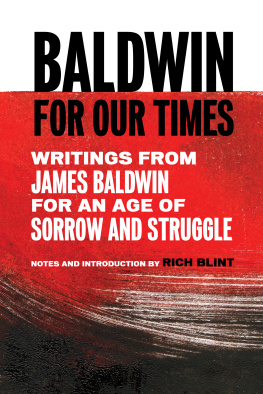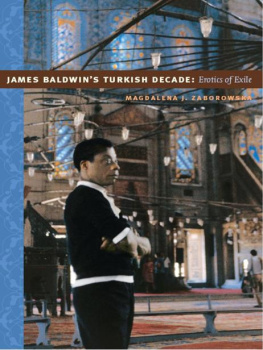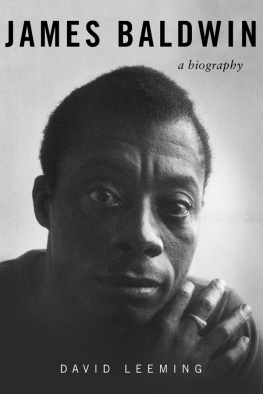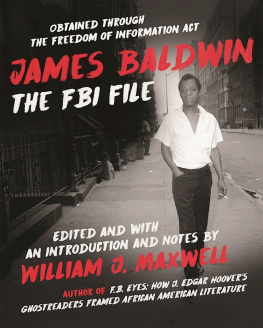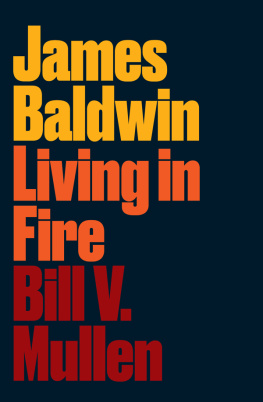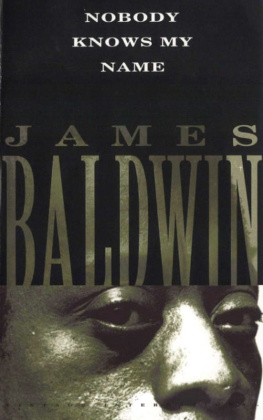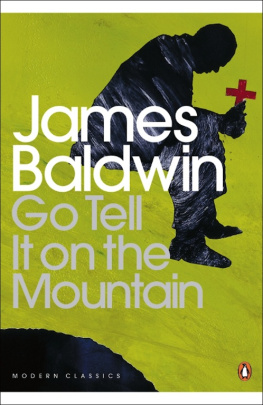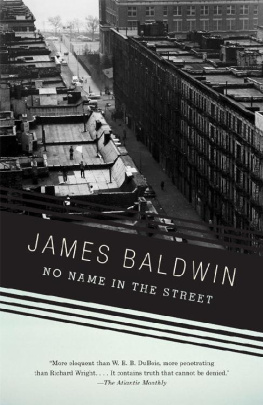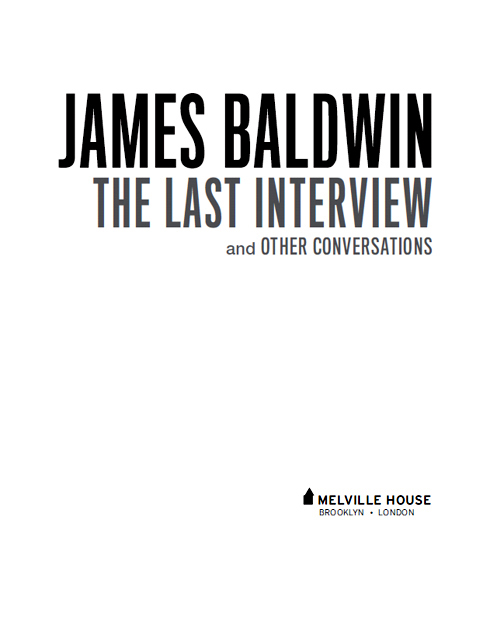JAMES BALDWIN: THE LAST INTERVIEW
AND OTHER CONVERSATIONS
Copyright 2014 by Melville House Publishing
An Interview with James Baldwin 1961 by Studs Terkel. First published in Conversations with James Baldwin (University Press of Mississippi, 1989).
Reprinted here by permission of the Studs Terkel Radio Archive.
The Studs Terkel Radio Archive (www.studsterkel.org) is managed by the WFMT Radio Network in partnership with the Studs Terkel Center for Oral History of the Chicago History Museum.
James BaldwinReflections of a Maverick 1984 by The James Baldwin Estate. First published in The New York Times Book Review, May 27, 1984.
Go the Way Your Blood Beats: An Interview with James Baldwin 1984 by Richard Goldstein. First published in The Village Voice, June 26, 1984.
Reprinted here by permission of the interviewer.
The Last Interview 1987 by Quincy Troupe. First published in James Baldwin:
The Legacy, ed. Quincy Troupe (Simon & Schuster, 1989). Reprinted here by permission of the interviewer.
Melville House Publishing
145 Plymouth Street
Brooklyn, NY 11201
and
8 Blackstock Mews
Islington
London N4 2BT
mhpbooks.com facebook.com/mhpbooks @melvillehouse
Library of Congress Cataloging-in-Publication Data
Baldwin, James, 19241987.
James Baldwin : the last interview and other conversations / James Baldwin; contributions by Quincy Troupe et al.
pages cm
ISBN 978-1-61219-400-4 (paperback)
ISBN 978-1-61219-401-1 (ebook)
1. Baldwin, James, 19241987Interviews. 2. Authors, American20th centuryInterviews. 3. African American authorsBiography. I. Troupe, Quincy. II. Title.
PS3552.A45Z46 2014
818.5409dc23
[B]
2014035168
v3.1
CONTENTS
Interview by Studs Terkel
Almanac, WFMT, Chicago
December 29, 1961
Interview by Julius Lester
The New York Times Book Review
May 27, 1984
Interview by Richard Goldstein
The Village Voice
June 26, 1984
Interview by Quincy Troupe
St. Paul de Vence, France
November 1987
AN INTERVIEW WITH JAMES BALDWIN
INTERVIEW BY STUDS TERKEL
ALMANAC, WFMT, CHICAGO
DECEMBER 29, 1961
When it thunders and lightning and the wind begins to blow,
When it thunders and lightning and the wind begins to blow,
Theres thousands of people
They aint got no place to go.
My house fell down,
And I cant live there no more.
Bessie Smith, Back Water Blues (1927)
TERKEL : Sitting with me hearing Bessie Smith singing of disaster, a flood, is James Baldwin, the young American novelist. But perhaps a more specific description of Mr. Baldwin, since he is one of the rare men in the world who seems to know who he is today, would be: James Baldwin, brilliant young Negro American writer. As you listen to this record of Bessie Smith, Jim, what is your feeling?
BALDWIN : It is very hard to describe that feeling. The first time I heard this record was in Europe, and under very different circumstances than I had ever listened to Bessie in New York. What struck me was the fact that she was singing, as you say, about a disaster, which had almost killed her, and she accepted it and was going beyond it. The fantastic understatement in it. It is the way I want to write, you know. When she says, My house fell down, and I cant live there no moreit is a great a great sentence. A great achievement.
TERKEL : Im looking at a passage in your new book, a remarkable one, Nobody Knows My Name, a series of essays, articles, opinions. You say here that when you went to live in the mountains of Switzerland you arrived armed with two Bessie Smith records and a typewriter.
I began to try to re-create the life I had first known as a child and from which I had spent so many years in flight, you wrote. It was Bessie Smith, through her tone and her cadence, who helped me to dig back to the way I myself must have spoken when I was a pickaninny, and to remember the things I had heard and seen and felt. I had buried them very deep. Now, heres the part, Jim: I had never listened to Bessie Smith in America (in the same way that, for years, I never touched watermelon), but in Europe she helped me to reconcile myself to being a nigger.
BALDWIN : Well, that winter in Switzerland, I was working on my first novelI thought I would never be able to finish itand I finally realized that one of the reasons that I couldnt finish this novel was that I was ashamed of where I came from and where I had been. I was ashamed of the life in the Negro church, ashamed of my father, ashamed of the Blues, ashamed of Jazz, and, of course, ashamed of watermelon: all of these stereotypes that the country inflicts on Negroes, that we all eat watermelon or we all do nothing but sing the Blues. Well, I was afraid of all that; and I ran from it.
When I say I was trying to dig back to the way I myself must have spoken when I was little, I realized that I had acquired so many affectations, had told myself so many lies, that I really had buried myself beneath a whole fantastic image of myself which wasnt mine, but white peoples image of me.
I realized that I had not always talkedobviously I hadnt always talkedthe way I had forced myself to learn how to talk. I had to find out what I had been like in the beginning, in order, just technically as a writer, to re-create Negro speech. I realized it was a cadence; it was not a question of dropping ss or ns or gs, but a question of the beat. Bessie had the beat. In that icy wilderness, as far removed from Harlem as anything you can imagine, with Bessie Smith and me I began
TERKEL : And white snow
BALDWIN : And white snow, white mountains, and white faces. Those Swiss people really thought I had been sent by the devil; it was a very strange They had never seen a Negro before. In this isolation I managed to finish the book. And I played Bessie every day. A lot of the book is in dialogue, you know, and I corrected things according to what I was able to hear when Bessie sang, and when James P. Johnson plays. Its that tone, that sound, which is in me.
TERKEL : This tone is in your forthcoming novel?
BALDWIN : Yes, yes, in a forthcoming novel.
TERKEL : Did you feel a sense of shame about a heritage that is really so rich, when you accepted the white mans stereotype of yourself?
BALDWIN : Im afraid that is one of the great dilemmas, one of the great psychological hazards, of being an American Negro. In fact, much more than that. Ive seen a great many people go under because of this dilemma. Every Negro in America is in one way or another menaced by it. One is born in a white country, a white Protestant Puritan country, where one was once a slave, where all standards and all the images when you open your eyes on the world, everything you see: none of it applies to you.
You go to white movies and, like everybody else, you fall in love with Joan Crawford, and you root for the Good Guys who are killing off the Indians. It comes as a great psychological collision when you realize all of these things are really metaphors for your oppression, and will lead into a kind of psychological warfare in which you may perish. I was born in the church, for example, and my father was a very rigid, righteous man. But we were in Harlemyou lived, you know, in a terrible house. Downstairs from us there were what my father called good-time people: a prostitute and all of her paramours, and all that jazz. I remember I loved this woman; she was very nice to us; but we were not allowed to go to her house, and if we went there, we were beaten for it.


